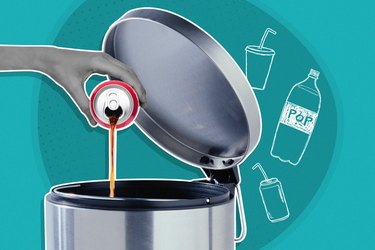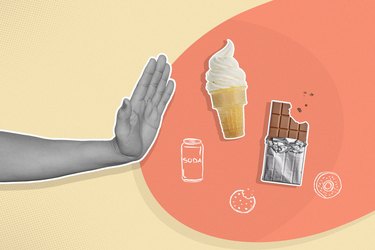
Whether you call it soda, pop or cola, you probably have a feeling that this sugary, carbonated beverage isn't the healthiest choice. Maybe you know that it can contribute to weight gain, or that it's been linked to diabetes. But the truth is, drinking soda regularly has a much broader effect on your body and your health.
With that in mind, here's a look at what really happens when you cut back on the drink, or even nix it altogether.
Video of the Day
Video of the Day
Your Brain
One of the most compelling reasons to put the kibosh on your soda habit is to lower the risk of brain-based ailments.
A study published May 2017 in Stroke that included more than 2,000 people found that those who drank diet soda had a higher risk of dementia and stroke. And more recently, a September 2019 study in JAMA Internal Medicine made the shocking conclusion that consuming soda, either regular or diet, is associated with death by any cause — a pretty convincing argument to kick the fizz.
Related Reading
Your Weight
We all seem to have that one friend who lost a lot of weight by simply eliminating soda from his diet — but does the research back up this phenomenon?
On the surface, it makes sense. A 12-ounce cola contains roughly 150 calories, all of which come from the 39 grams of added sugar (which gives you zero nutrition). Cutting these empty calories from your diet — especially if you've been drinking multiple sodas per day — could help you reach the calorie deficit required to start shedding pounds. (Keep in mind that switching from regular to diet soda is no longer considered suitable for weight loss, as no research has proven its effectiveness and some has linked it to more concerning health issues.)
And according to an August 2013 review published in Obesity Reviews, it is definitive that sugar-sweetened beverages like soda lead to weight gain — but the researchers stop short of claiming that nixing these drinks will lead to weight loss. After all, if you're replacing them with food or beverages with an equal calorie count, you'll be unlikely to see the scale move.
In my experience as a registered dietitian, though, I've found that cutting out the extra sugar from these drinks often nudges people to make other healthy changes in their diets, too, which can lead to weight loss over time.
Your Teeth
If the sugar in soda doesn't get you thinking about cavities — well, it should. According to the Penn Dental Family Practice, the sugar in soda feeds the bacteria in your mouth and forms acid, which can erode your pearly whites and weaken your enamel. What's worse is that diet soda also contains acid, which can double up the damage. As the enamel weakens more and more over time, tooth decay sets in.
Giving up soda, and opting for less sugary and less acidic drinks, gives your teeth a much-needed break from this barrage.
Plus, replacing soda with smarter choices could actually benefit your smile. For example, drinking low-fat milk gives your body the nutrients it needs (namely, calcium and vitamin D) to build stronger bones and teeth. Learn more about how to cut down on sugar here.
Your Heart
It might be hard to imagine that sipping on a soda could have any effect on your heart, but listen to this: According to a May 2015 study in Nutrients, just one can of the fizzy stuff per day (regular or diet) is linked to a higher risk for metabolic syndrome, which is a contributor to cardiovascular disease. In fact, drinking two or more sugar-sweetened beverages per day increases your risk for heart disease or stroke by 33 percent, according to Harvard Medical School.
What gives? Well, if you're drinking regular soda, all that added sugar may be causing chronic inflammation in your body. According to the National Center for Biotechnology Information, excess sugar in the diet is associated with inflammation in the body, and heart disease is considered a product of chronic inflammation. Men should not have more than 9 teaspoons of added sugar per day and women should stay below 6 grams of added sugar, according to the American Heart Association — so one 12-ounce can of soda already puts you over that recommendation.
Your Blood
Another way soda's high sugar content affects your body? It causes your blood sugar levels to skyrocket. In a May 2018 study in Current Developments in Nutrition, researchers found a positive link between soda drinking and diabetes, and they noted that diet soda may be a culprit as well, especially for people who have overweight or obesity. These findings were confirmed in a large September 2019 study in Diabetes Care, too.
Dropping pop from your diet cuts your risk of developing diabetes, and eating more slower-digesting carbohydrates (think: fiber-rich veggies, brown rice, whole-wheat products) can help keep your blood sugar in check.
Tips to Nix Soda
If you're a die-hard soda drinker who's ready to cut back, it's probably best to scale down slowly rather than going cold turkey.
Scale down slowly. Rather than giving up your fix cold turkey, try replacing one drink per day with a healthier alternative, like water or milk.
Keep the fizz, slash the sugar. If you crave carbonation, try unsweetened seltzer water, and add fresh fruit for flavor.
Remove temptation. Purge any offending cans or bottles from your pantry and fridge. If it's not in your house or easily available, you'll be less likely to indulge.
Confide in a friend or coworker. Let someone close to you in on your goal so they can help hold you accountable.
- Obesity Reviews: "Resolved: There is Sufficient Scientific Evidence that Decreasing Sugar-Sweetened Beverage Consumption Will Reduce the Prevalence of Obesity and Obesity-Related diseases"
- Nutrients: "Diet Soft Drink Consumption is Associated with the Metabolic Syndrome: A Two Sample Comparison"
- Circulation: "Long-Term Consumption of Sugar-Sweetened and Artificially Sweetened Beverages and Risk of Mortality in US Adults"
- Harvard Medical School: "Sugary Drinks Linked to Higher Risk of Dying From Heart Disease"
- National Center for Biotechnology Information: "Chronic Inflammation"
- American Heart Association: "Added Sugars"
- Stroke: "Sugar- and Artificially-Sweetened Beverages and The Risks of Incident Stroke and Dementia: A Prospective Cohort Study"
- JAMA Internal Medicine: "Association Between Soft Drink Consumption and Mortality in 10 European Countries"
- Current Developments in Nutrition: "Diet Soda and Sugar-Sweetened Soda Consumption in Relation to Incident Diabetes in the Northern Manhattan Study"
- Diabetes Care: "Changes in Consumption of Sugary Beverages and Artificially Sweetened Beverages and Subsequent Risk of Type 2 Diabetes: Results From Three Large Prospective U.S. Cohorts of Women and Men"
- Penn Dental Family Practice: "Effects of Soda on Teeth"



